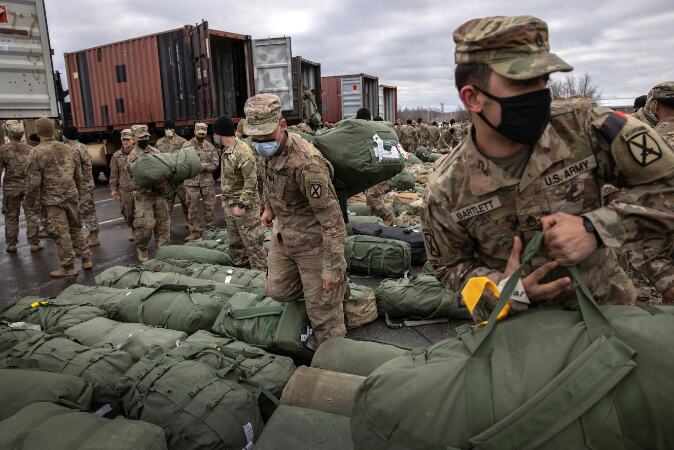A potential proxy?
Contrary to Pakistan's persistent denial, evident signs of US wooing the country to maintain a strategic hold over Afghanistan tell a different story

There are mixed signals on whether the US is trying to send overtures to Pakistan for setting up military bases on its soil to deal with the hostile forces active in Afghanistan. This confusing scene has emerged from the conflicting reports of Pakistan being in complete denial mode while the US gesticulating the matter is open and under active consideration. From an objective point of view, after factoring in all pros and cons, it appears that the US is certainly trying to woo Pakistan which it feels could be a useful strategic partner to neutralise anti-American terror groups in Afghanistan that may pose a great threat after the complete withdrawal of the US forces.
In this context, it is pertinent to highlight the views of the Pakistani Foreign Minister Shah Mahmood Qureshi, expressed at a meeting on 'Israel's systematic assault against Palestinians in Al Aqsa Mosque" on May 25. The Minister was categorical in stating that no US bases were to be allowed in Pakistan for any Counter Terror (CT) operations in Afghanistan. He even ruled out the use of drones by the US forces operating from Pakistan. His tenor, as always, was more for domestic consumption, possibly for the anti-American quarters within Pakistan and Afghanistan, than for the ears of the US. This said, Qureshi is also known for his quick backtracking as seen on various occasions.
On the other hand, the US Secretary of Defence, Lloyd Austin, has lately been in touch with the Pakistani Chief of the Army Staff, Gen Qamar Ahmad Bajwa, often describing the 'usefulness' of the US-Pakistan strategic partnership. Meanwhile, the US Department of Defence has recently said that the US is keeping various options open for starting bases in Pakistan as "potential options". Significantly, the US Assistant Secretary of Defence for Indo Pacific affairs, David F Helvey, claimed recently before the Senate Armed Services Committee that Pakistan has allowed the US to have overflight and access to be able to support the US military presence in Afghanistan. In the same vein, Pentagon Press Secretary John F Kirdy averred that though it's still premature to say something categorically on the bases issue, diplomatic discussions between the US and Pakistan are still on. Contradictions were once again seen in the May 25 statement of Pakistan Foreign Office spokesperson Zahid Hafeez Chaudhry. Zahid said before the media that Pakistan has no plans whatsoever about allowing any military base in the country. He further said that these are all mere speculations, baseless and irresponsible, which need to be avoided.
In yet another important development on US-Pakistan perceived warming up of relations, Pakistan's National Security Advisor Moeed Yusuf met his US counterpart, Jack Sullivan at Geneva on May 23, away from any glare, ostensibly to beef up relations between the two nations. This is also seen as an attempt to reach out to the US, possibly for the reversal of Trump's policy of ignoring Pakistan and stopping all security assistance. At the quiet meeting between the two NSAs in Geneva, the newly appointed NSA of Pakistan, Moeed Yusuf presented a 'Pakistan Plan' to Sullivan. This plan is said to be a paradigm shift from the hitherto security or defence perspective and, as per the new thinking, touches upon the business, economy, investments, climate change, IT, energy, technology etc. The stress on the relationship, therefore, is now on geo-economic than geo-strategic aspects. This policy shift, according to Pakistani experts, has the blessings of the civilian and military leadership. In this context, it may be recapitulated that in March this year, an apex body under the leadership of Foreign Minister SM Qureshi, was formed with representatives from the ministries of commerce, human resource, power etc. to focus on priority areas vis-à-vis cooperation with the US. Plans are afoot, according to the new blueprint, that an America-Pakistan economy could be set up near the Karachi port. Pakistan finds the US as its largest market of exports. Moeed is likely to visit the US in the near future and take the plan forward to firm up the ambitions.
The unfolding of the events in the past week shows that there are conflicting indications about allowing or negating the US military bases in Pakistan. Yet, it is becoming increasingly clear that the US is in a wooing mood to utilise Pakistan. Reacting to the developments, the sceptics, however, feel that it will not be as easy on the part of Pakistan to respond favourably to the US overtures. This is because of the China factor. China, uneasy with the US' proactive role in Quad, may not easily accept any thaw between the US and Pakistan. As an all-weather ally of Pakistan, China is cautiously watching all these developments and is unlikely to be a mute spectator. Its reaction will be known only with the passage of time and how things shape up between the US and Pakistan. Similarly, Russia too is not expected to take kindly to any substantial tie-up between Pakistan and the US.
The writer is a retired IPS officer, a security analyst and a former National Security Advisor to the PM of Mauritius. Views expressed are personal




